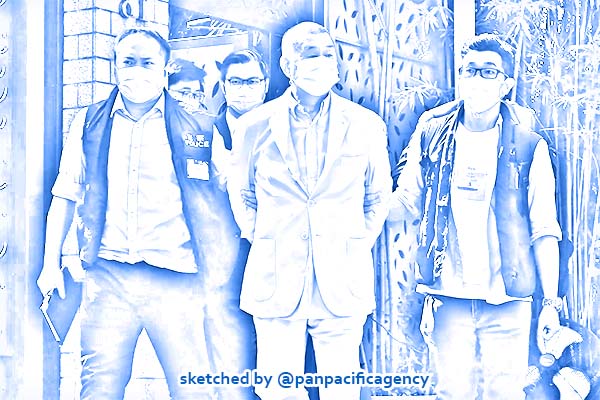Jimmy Lai convicted for taking part in Tiananmen vigil

Hong Kong media tycoon Jimmy Lai, centre, after his arrest on Monday. Photo: AP. Sketched by the Pan Pacific Agency.
HONG KONG, Dec 9, 2021, BBC. Hong Kong media mogul Jimmy Lai, along with two other prominent activists, has been found guilty for taking part in a vigil to mark the Tiananmen massacre. Lai, Gwyneth Ho and Chow Hang Tung were convicted for inciting and taking part in an unlawful assembly, BBC reported.
They were among thousands who defied a ban and took part in a vigil last June commemorating the 1989 crackdown at Beijing’s Tiananmen Square.
More than two dozen politicians and activists have been charged over it.
The trio were the last to receive their verdict as they chose to contest their charges. During their trial, they argued they had lit candles during the vigil in a personal capacity, and had not “incited” others to join the unauthorised rally.
However District Court Judge Amanda Woodcock dismissed the arguments “frankly nonsensical” and said their participation “was an act of defiance and protest against the police”.
Who are the three activists?
Lai is the founder of the now-defunct Apple Daily newspaper in Hong Kong, and has been one of the most prominent supporters of the city’s pro-democracy movement. He was jailed earlier this year for taking part in pro-democracy protests.
Ho is a former journalist turned opposition politician, while Chow is a former lawyer and the vice chairwoman of the now-defunct Hong Kong Alliance – the group that organised the vigil every year.
Both are also behind bars and have been denied bail, as they face multiple charges including some under a strict national security law that Beijing imposed on Hong Kong last year.
What was the Tiananmen vigil about?
The annual vigil has taken place in Hong Kong for decades, often attracting tens of thousands who gather to mark the anniversary of Chinese troops crushing peaceful democracy protests in Beijing’s Tiananmen Square on 4 June 1989. International condemnation ensued after troops and tanks opened fire on protesters in Beijing.
Hong Kong used to be one of the very few places in China where the incident could still be commemorated or even talked about – it is highly sensitive in mainland China, which bans any events marking the incident and scrubs mentions from social media.
But in 2020 Hong Kong authorities banned the vigil for the first time in 30 years, citing Covid restrictions. Activists accused officials of bowing to pressure from Beijing to muzzle pro-democracy expression.
Tens of thousands of people defied the ban to attend the vigil that night, knocking down barricades that had been erected around Hong Kong’s Victoria Park.
The ban on the vigil continued this year, and saw a more muted protest.